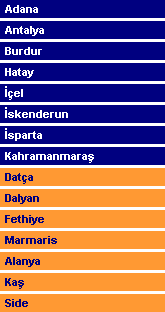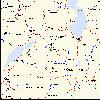| Isparta... |
|
Isparta exists in a country of fragrant roses and beautiful lakes of peaceful waters, one of the pretty cities in the
Mediterranean region. Around 45 % of Isparta consists of high plateaus. There are many impressive caves around Isparta.
If you go to Kirazildere or the environs of Sidre, you may view this lovely site with a bird's eye. Here is the Egirdir
Lake which is one of the most fascinating of Türkiye, extending calmly along wide forests covering the foot of the
mountains behind. It is an excellent site for relaxing, while it also offers opportunities for sur and fishing. Some of
other picnicking sites are Golcuk Lake (13 km southwest from Isparta), Kirazlidere, Ayazma, Milas, Caravanserai, Altinkum
Beach, Camyol, Kovada National Park and Lake, and Kasnak Forest, famous for various kinds of butterflies. The town of the
same name, is a rarely beautiful site not only because of the charming scene the lake provides, but also with the ancient
ruins decorating the land. The Ulu Mosque of 15th century stands here with its attractive minaret, along with
the Seljuk fortress and Byzantine churches. Antiocheia, the ancient city of Yalvac and ruins at Bayat are the other
monuments of sightseers' interest. National parks in Isparta are the Kovada and Kizildag, which please the visitors with
their natural beauties and historical remains. The Kovada Lake is made up of bays and beaches, surrounded by forests, and
possesses a fresh atmosphere just like the National Park of Kizildag full of thousands of nice cedar trees. Changing hands
continuosly throughout history, Isparta also holds many signs from earlier times. At the museum of the city, a rich
collection of ancient coins, fine examples from Turkish folklore, several Roman reliefs and works of art from the Ottoman
period are found. Firdevs Papa Mosque, Yilan Koran fountain and Kink minaret are also spectacular monuments, while Yalvac,
and Sarkikaraagac, are two other sites with ancient roots. Renowned for its unspoilt landscape and flora and fauna, the
Goller Bolgesi (Lake District) lies in a mountainous area 150 km north of Antalya. Isparta, high in the Taurus Mountains,
is a city of lakes with lovely coastal areas overgrown in the spring and summer with an exuberance of wild flowers. In the
city you should stop at the Ulu Mosque, built in 1417 by the Seljuks. The Bedesten, or covered bazaar, dates from 1561.
Firdevs Pasa Mosque was built in the 16th century by the great Ottoman architect Sinan. Be sure to see the
14th century Isparta Castle.
|
|

|








